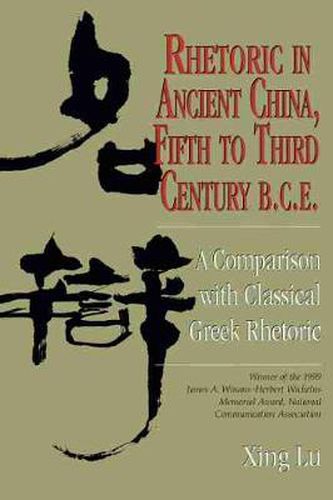Readings Newsletter
Become a Readings Member to make your shopping experience even easier.
Sign in or sign up for free!
You’re not far away from qualifying for FREE standard shipping within Australia
You’ve qualified for FREE standard shipping within Australia
The cart is loading…






Xing Lu examines language, art, persuasion, and argumentation in ancient China and offers a detailed and authentic account of ancient Chinese rhetorical theories and practices within the society’s philosophical, political, cultural, and linguistic contexts. She focuses on the works of five schools of thought and ten well-known Chinese thinkers from Confucius to Han Feizi to the the Later Mohists.
Lu compares Chinese rhetorical perspectives with those of the ancient Greeks, illustrating that the Greeks and the Chinese shared a view of rhetoric as an ethical enterprise and of speech as a rational and psychological activity. The two traditions differed, however, in their rhetorical education, sense of rationality, perceptions of the role of language, approach to the treatment and study of rhetoric, and expression of emotions. Lu also links ancient Chinese rhetorical perspectives with contemporary Chinese interpersonal and political communication behavior and offers suggestions for a multicultural rhetoric that recognizes both culturally specific and transcultural elements of human communication.
$9.00 standard shipping within Australia
FREE standard shipping within Australia for orders over $100.00
Express & International shipping calculated at checkout
Xing Lu examines language, art, persuasion, and argumentation in ancient China and offers a detailed and authentic account of ancient Chinese rhetorical theories and practices within the society’s philosophical, political, cultural, and linguistic contexts. She focuses on the works of five schools of thought and ten well-known Chinese thinkers from Confucius to Han Feizi to the the Later Mohists.
Lu compares Chinese rhetorical perspectives with those of the ancient Greeks, illustrating that the Greeks and the Chinese shared a view of rhetoric as an ethical enterprise and of speech as a rational and psychological activity. The two traditions differed, however, in their rhetorical education, sense of rationality, perceptions of the role of language, approach to the treatment and study of rhetoric, and expression of emotions. Lu also links ancient Chinese rhetorical perspectives with contemporary Chinese interpersonal and political communication behavior and offers suggestions for a multicultural rhetoric that recognizes both culturally specific and transcultural elements of human communication.